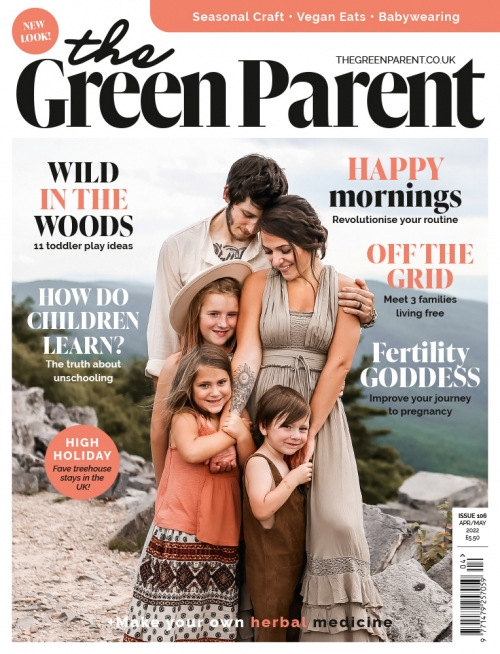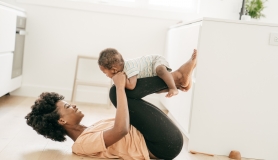FROM THE MOMENT A BABY IS born, we make choices on their behalf. Cloth or disposable, sling or buggy, co-sleeping or crib – never have we had so much power over someone else’s life experiences. And whilst there’s a bewildering array of experts telling us which choices are the ‘right’ ones, the diversity of parenting styles I see around me suggests that any claim to have the definitive answer is likely to be suspect. By the time it gets to education, a few short years later, the choices are far less diverse. School is seen as inevitable, with many not even realising that there are other ways to receive an education. Even when parents do choose, it tends to be between different types of schools all of which accept core assumptions such as the need for age-based classes and a standardised curriculum, whether it be based on the National Curriculum, Maria Montessori or Rudolf Steiner.
Making different choices
However, a few parents make the radical choice to not ‘school’ their kids at all. Not only do they not send them to school, they don’t teach them at home either. How and why do they decide this? This choice is something which Rebecca English (Queensland University of Technology) has made the focus of her research. Her interviews with parents indicate that their educational choices are tied closely to their philosophy of parenting. They believe that unschooling is the best option for their child, just as strongly as parents who send their children to elite schools believe that this is the best option for them.
Where unschooling parents were different to other parents was that their choice was based on theory. The research that most parents do into education involves visiting schools, checking the league tables and perhaps reading about different types of schools. Unschooling parents were the only research participants who asked if English had read any educational and parenting theorists (mostly citing Holt, Illich, Kohn, Liedloff, Bowlby & Ainsworth and Sears) and who referred to these as some of the reasons why they had made their choices.
English explained to me, “My hypothesis is always that you can’t understand a school (or home education) choice without understanding what parents believe good mothers (and, research says it’s principally mothers) do and how they educate.”
For most parents, good parenting involves supporting your child through school and helping them with their homework. What happens to someone’s understanding of good parenting which leads them to diverge so much from the mainstream as to choose unschooling?
English’s research gives us some clues. She explained how, of the unschooling parents she talked to, “Many of them are ‘damaged’ by unhappy childhoods and suffered dreadful school experiences/memories. Many of those experiences were as a student but also as a teacher. I met a lot of lapsed teachers on my journey and heard the sentence, ‘after what I saw, I couldn’t do that to my child,’ more times than I could count”.
From Packing Books to Trusting Children
Pat Farenga knows the exact moment when things changed for him. After college, he trained to be an English teacher, but was initially unable to get a job. He ended up working at Holt Associates, where he packed books for John Holt, author of many seminal books on unschooling. One evening in the office he met Holt himself.
“Holt looked at me and said, ‘What do you want to be? You don’t want to be packing books here for the rest of your life’. I said I wanted to be a teacher. And he asked why? I told him I liked working with children. He said, ‘You’re not going to work with children, you’re going to work on children.’ I got offended, what do you mean, it’s a respected profession!” Pat Farenga never did start teaching. Holt recommended that he read some books, he did. He also reflected on his own experiences of education, the good and the bad. By the time his three daughters came along, he had convinced his initially sceptical wife and they unschooled them. He has spent his career talking and writing about unschooling. He told me how he thinks we are pressured into thinking we need school, teaching and specialisation – and that we need to pay for it.
“School creates these hierarchies that we all buy into. Now it’s computer science and STEM, it’s become this idea of specialisation that has really taken a hold on us, particularly in the last 15 years with technological advances in our society. The system says it takes four years to learn computer science and that’s nonsense, some people learn really quickly and others don’t, they need more than four years. So the system hasn’t changed. In fact they’ve made it more rigid, and we’re feeling that pressure… We have this situation where we push and shame people into choosing the consumerist model – buy your education rather than make your education.” At his talks on unschooling he gets parents to reflect on learning by starting with asking them whom among them has taught their children to walk or talk. This is how John Holt started his talks in the 1960s and 1970s – when no one would raise their hands. At a conference in London in the 1990s, Farenga noticed something new – some of the parents did raise their hands. They felt that they had taught their child to walk and talk.
Farenga argues that the whole way we think about learning and education is becoming increasingly specialised and commodified, something which comes from outside rather than within. Because if even walking and talking need to be taught, then what happens if we don’t teach a child ‘correctly’? Do parents need special training courses on how to talk to their children? Moving the focus from the learner to the teacher opens up opportunities for commodification, for parents being sold skills that perhaps they never lacked.
For Farenga, trusting ourselves and our children is fundamental to his philosophy, and something he feels that schools undermine with their focus on grades and assessments. “Our parents didn’t trust us and the school didn’t trust us to learn. Unless we get a gold star we don’t think we’ve really learnt it.”
From Astrophysics to Overseas Adventures
Blake Boles, author of “The Art of Selfdirected Learning” was fully immersed in formal education until early adulthood. He was studying astrophysics at Berkeley when a friend handed him a book by John Taylor Gatto, a former New York Teacher of the Year who became an outspoken critic of the education system. It shook the foundations of his understanding of the world.
In his book, Boles describes this process as being ‘a coup in my mind’. He gave up astrophysics and moved over to studying education theory. He told me how he thought about a lot of traditional schooling. “Just wasting kids time, a massive waste of human capital. It’s silly and it’s tragic. And even for people like me who are the winners of the system, who performed well in the school game when called upon, I still felt a massive part of my youth was wasted. That’s just sad and it shouldn’t happen.” Abandoning his plans to be a research scientist, Boles instead set up his own business running trips for unschoolers – and travelled the USA, researching selfdirected learning and writing books. When I talked to him he was in New Zealand planning his next trip. He is passionate about letting parents know that there are real alternatives to school. “There are parents who notice their child struggling; visibly not doing well in school. It could be anxiety or it could be them raging against doing their homework. I want these parents to know: you don’t have to force your kids through that, there are all these other paths from the extreme to the not so extreme, you can still go to college, you can still get a job. They will be able to join normal society and everything will be fine. That’s why I write.” And Boles is clear on what he thinks the alternative is, and what he does on his trips with unschoolers, explaining to me. “If you set up the right environment with the right people, then the selfdirected learning, realisations, growth or skill building will happen.”
Nobody can be forced to learn
Returning to Rebecca English, she explained her own philosophy which led her to unschool her own young children. “In my 20 years’ experience, I’ve never seen anybody learn something they weren’t ready to learn or didn’t want to learn. The old “you can lead a horse to water, but you can’t make it drink” adage rings true. Nobody can be forced to learn anything, and, even if you can make them do something, they won’t absorb it deeply.” And this applies to parents as well. No one can be forced to learn about selfdirected education, and we can’t predict why one person might experience a ‘coup’ whilst another is left unconvinced. All we can say is that the more the information is out there, more people will have the opportunity to discover that schooling is only one way to get an education, and for some, this will be a life-changing discovery.
MORE INSPIRATION
READ The Art of Self-Directed Learning by Blake Boles
Teach Your Own: The John Holt Book of Home Schooling by John Holt and Pat Farenga
How Children Fail by John Holt
How Children Learn at Home by Alan Thomas and Harriet Pattison
Dumbing Us Down: The Hidden Curriculum of Compulsory Schooling by John Taylor Gatto
Naomi is a clinical psychologist who has two children aged seven and 10. She unschooled them until 2018 when they moved to Paris to attend a democratic school. She works with parents, children and families remotely.







